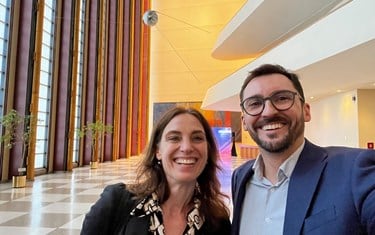William Sparling is a Chartered town planner, holds a PhD in Localism and Urban Governance and is a Planning Team Leader at Oxford City Council. He is currently secretary of the RTPI South East Regional Management Board, a member of the RTPI Volunteers Advisory Group, a Planning Aid England case work volunteer and member of the PAE Steering Group.
 Thinking back to my early time working in planning, when the late Harvey Pritchard drove a few of us students from Leeds to a cold, remote village hall in Lincolnshire, it took a few years for me to realise the true benefit to my career. Even now it feels like a pivotal moment, that is both a long-lasting memory and one I am pleased I agreed to. A parish council was grappling with newly formed neighbourhood planning and associated community rights, and we went to help through Planning Aid. It became clear there are loads of opportunities to volunteer that can bring a lot of benefit and develop professional networks. More recently, online conversations mean a professional network that extends across the UK.
Thinking back to my early time working in planning, when the late Harvey Pritchard drove a few of us students from Leeds to a cold, remote village hall in Lincolnshire, it took a few years for me to realise the true benefit to my career. Even now it feels like a pivotal moment, that is both a long-lasting memory and one I am pleased I agreed to. A parish council was grappling with newly formed neighbourhood planning and associated community rights, and we went to help through Planning Aid. It became clear there are loads of opportunities to volunteer that can bring a lot of benefit and develop professional networks. More recently, online conversations mean a professional network that extends across the UK.
Attendance as a student was exposure to a new challenge, new atmosphere and a hard lesson that to work in planning you need a thick skin, technical expertise and you better be good at communicating with a diverse audience. Empowering communities is hard, professionally uncertain but rewarding. There was no room for complacency or hesitancy as the parish outlined their deeply felt local problems, that new housing could solve some, but would also bring lots of new issues and deepen the existing ones. Thankfully we weren’t the target of the ire. Planning certainly was, but at the same time could be the solution through localism.
It feels like so much time has passed since then, but the challenges of working in planning are ever present. Planning also has new challenges to deal with, including misinformation, a very negative perception of new homes in the popular press, massive housing waiting lists and an apparent avalanche of technical problems cutting across scales of planning and sectors of governance. Planning is being piled high with problems, many not of its own making or even in its sphere of influence, policy remit or legislative powers.
Indeed, the profession needs its professional organisations more now than it ever has. The RTPI, has a core network of staff both supported by volunteers (committees, arranging CPD events and so on) but also influencing their work (General Assembly, professional networks for example). As a regional secretary I spend a few hours a month supporting the work of a regional committee taking notes and actions and providing some input into the CPD events.
My point is that you can help shape things within the RTPI with just a little time each month, or more if you are inclined to lead on lots of CPD events, support a president’s visit or join something like the general assembly. I am also part of the volunteer advisory group, sharing our experience to streamline, modernise and enhance the volunteer experience. This is a work in progress but one the RTPI seem to have invested in with the new volunteer hub – at first a bit clunky but improving quickly.
There are benefits to the individual as well as the collective. As a planner you can take forward your career by developing your skills, knowledge and experience. You could be helping on committees, delivering cutting edge CPD events (think [AI] in planning, water neutrality, politics in planning), which are attended by hundreds (many of our online events in the South-East have 300 - 500 signed up – yes really!). Plus free career development and CPD for LPA planners and exposure for private sector planners building a client base.
Over one thousand volunteers are involved a wide variety of activities, such as arranging social and networking events, running awards evenings and black tie dinners, providing a daily email advice service to hundreds of people in need of help, giving talks to inspire children in schools, building links with planning schools, supporting health and wellbeing (the NW region hold spa days apparently…), and spreading a message about planning being a worthwhile and important profession. There are debates and roundtables in prestigious venues plus professional networks run by volunteers that directly influence policy outputs and briefings, which in turn lend weight when having difficult conversations with Government.
I’d encourage town planners to identify opportunities and get involved. I have found volunteering to be worthwhile, educational, and influential in my career through facing challenging situations and its absolutely worth trying. The cold village hall in Lincolnshire feels a long time ago but has certainly been a constant reminder to keep shaping good planning outcomes and ensuring the RTPI exists for its members through its volunteers. It can also provide a professional sense of purpose when you are bogged down in the detail of the day job.
Find out more about volunteering at the RTPI.


